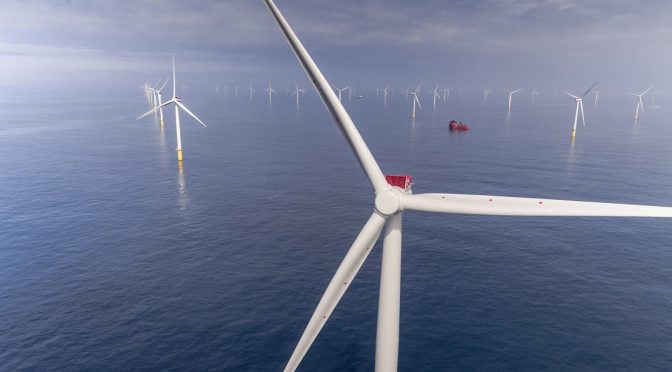Rising demand for wind power as a
response to the transition towards non-polluting energies drove Siemens
Gamesa’s commercial activity in the first quarter of FY 2020. The
company experienced an 82% increase in order intake, with firm orders
rising to €4,628m, raising the order book to a record €28,089m,
underlining solid long-term growth prospects.
As announced in a regulatory disclosure on 29 January, the company
experienced an unforeseen €150m impact from costs on five onshore
projects (1.1 GW) in northern Europe, mainly Norway, caused by adverse
road conditions and the unusual early arrival of winter weather, which
delayed project execution substantially.
As a result, Siemens Gamesa adjusted its profitability target by one
percentage point and expects to end the fiscal year with an EBIT margin
before PPA, integration and restructuring costs of between 4.5% and 6% .
“This was not an easy quarter for Siemens Gamesa. The company’s
financial performance fell short of the expectations we had when we set
our targets for the year. However, this was a one-off impact and we do
not expect it to recur in future quarters as we are taking the necessary
measures. We have stepped up risk analysis to ensure project execution
is on track and we will also strengthen our internal control system to
avoid a recurrence,” said Markus Tacke, CEO of Siemens Gamesa.
“The results also underlined the long-term opportunities for wind energy
and Siemens Gamesa. We are in an industry with huge potential and we
are taking advantage of this with intense commercial activity that
resulted in a record order book. Moreover, the acquisition of strategic
assets from Senvion will boost our service business, where margins are
higher,” added Tacke.
Strong commercial activity
Commercial activity increased significantly in the offshore segment,
with order intake in the last twelve months doubling to 3,343 MW. Of
that figure, 1,279 MW were signed in the first quarter. Siemens Gamesa
is the clear leader in this segment, with a pipeline of projects
totaling 9.6 GW .
Onshore also registered very positive commercial activity, with order
intake up 8.1% to 2.6 GW. China (18%) and Canada (16%) were the main
sources of orders in the quarter. Moreover, almost half of orders were
for the new models of turbines over 4 MW.
Service attained an extraordinary level of commercial activity, with
order intake reaching €1,470m in Q1 FY2020, four times the figure in Q1
FY 2019. This business unit, which has very profitable contracts,
accounts for 46% of the company’s order book.
Stable sales and a sound balance sheet
Between October and December, Siemens Gamesa booked €2,001m in revenue
(-12%), in line with the full-year guidance (€10,200m-€10,600m). The low
end of the revenue guidance has already been booked in orders.
The company remains focused on retaining a sound balance sheet. As of 31
December, it had a net cash position of €175m. Moreover, Siemens Gamesa
has introduced sustainability criteria throughout its funding chain.
| Siemens Gamesa key figures (€m) | Q1 FY 2020 (Oct. 19-Dec. 19) | Q1FY 2019 (Oct. 18-Dec. 18) | |
| Revenue: | 2,001 | 2,262 | |
| EBIT before PPA and integration and restructuring costs: | -136 | 138 | |
| Reported EBIT: | -229 | 40 | |
| EBIT margin before PPA and integration and restructuring costs: | -6.8% | 6.1% | |
| Reported net profit: | -174 | 18 |
Good long-term prospects
As evidenced by the order intake and backlog figures, demand for wind
power is higher than ever. The GWEC estimates that global wind power
installations will rise from 51 GW per year in 2018 to 130 GW per year
in 2040.
Despite the current situation, Siemens Gamesa is solidly positioned to
benefit from wind power’s potential and to ensure success in the long
term. It has scheduled a Capital Markets Day for 6 May, when it will
give more details of the company’s strategy for the coming years.
[1] Guidance excludes the impact of the acquisition of selected assets from Senvion and any impact from the change in the composition of SGRE shareholder base. [2] Pipeline includes preferred supply agreements and conditional orders that are not part of SGRE’s Offshore backlog


